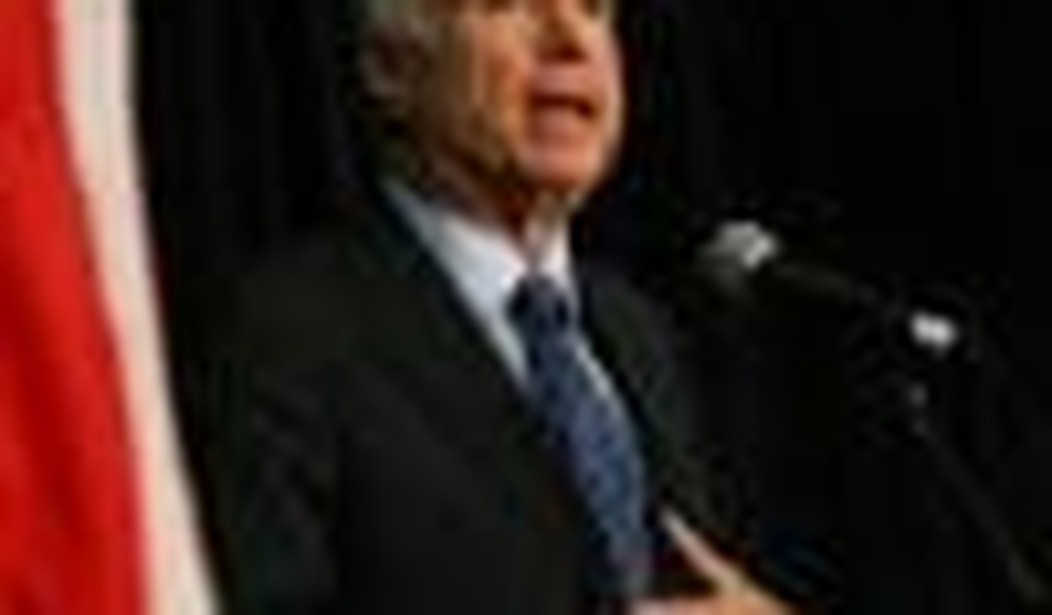One factor that distinguishes John McCain from his presidential predecessor as well as this year’s likely Democratic nominee is how frequently he makes himself available to the media, old as well as new. Just two weeks ago, he held a conference call with bloggers, including several representing left-of-center websites.
Yesterday, while in Los Angeles, his campaign also reached out to bloggers, inviting a number — including yours truly — to attend a “press availability” in Beverly Hills. Along with the local media there, we felt a bit out of place, given the camaraderie of the press corps which travels with the campaign. But the candidate treated us no differently.
Indeed, the Arizona senator seemed to relish the exchange. At one point when a staffer said they had time for just one more question, he overruled her, saying he’d take a few more. He responded quickly and deftly to all but one question, only occasionally failing to provide a direct answer. He stammered a bit when replying to a question about cluster bombs, stating that he hadn’t looked into the issue, but his decision on whether or not to ban them would “depend on the circumstances.”
The Republican candidate wanted to focus on the Iraq war and national security, distinguishing his positions and record from those of his likely Democratic rival, Senator Barack Obama. The press, however, seemed more interested in the revelations from former White House Press Secretary Scott McClellan and the Arizona senator’s relationship to the incumbent president.
McCain started by reading a statement, commending Obama for considering a trip to Iraq. He was confident that once his Illinois colleague had seen the “improvements on the ground” there, he would better understand the “consequences of a quick withdrawal,” which could make the nation a base for al-Qaeda and subject to increasing influence from Iran.
The presumptive GOP nominee said his likely Democratic rival could “learn a lot” from General David Petraeus and wondered why he didn’t sit down with him while expressing a willingness to talk with Iranian President Mahmoud Ahmadinejad, a man who has denied one Holocaust and wants to “inflict another.”
The first reporter to ask a question turned to McClellan’s book, What Happened: Inside the Bush White House and Washington’s Culture of Deception, asking the senator about the former White House press secretary’s description of the administration’s war rationale as “propaganda” and its public relations strategy as “deceptive.” McCain said he was “glad Saddam Hussein is no longer in power” and pointed out that all intelligence agencies, not just here but around the world as well, believed Hussein had weapons of mass destruction.
But McCain distinguished himself from the man he would like to succeed, saying he had opposed the failed strategy in Iraq for four years and pressed for changes. He stressed the success of the new strategy.
On gay marriage, he said he has always supported maintaining the “unique status of marriage” as the union of a man and a woman and believes that the people, not courts, should decide the issue.
Claiming that he can win in the Golden State, he said he would “compete in California.”
He recalled his past support of comprehensive immigration reform legislation, while claiming his bill had failed because “the American people did not trust us to secure our borders.” He said we must first secure the border and as president he would ask border state governors to certify as much before moving on to other immigration issues.
One reporter wondered if his confidence that Senator Obama would change his mind after he goes to Iraq suggests the Republican candidate believes that anyone who sees the Iraq situation differently is wrong. In his reply, he recognized the American people’s frustration with the situation in Iraq, ascribing it to the war having been “so badly mishandled for so long.”
A new strategy, however, has brought better results: the “facts on the ground would encourage any objective observer. … Facts are facts. The strategy is succeeding. We will come home with honor and victory.”
Despite the lack of public support for a war he backs, he believes voters “will support my judgment, knowledge, and my experience.” Those qualities would serve him well in dealing with other tense foreign policy situations, including those in Iran, Afghanistan, and Venezuela, whose president Hugo Chavez supports the Revolutionary Armed Forces of Colombia (FARC), a guerrilla group seeking to overthrow the elected government of that Latin American nation.
Throughout this press availability, the presumptive Republican nominee contrasted his record on foreign policy with that of Senator Obama. Observing that the likely Democratic nominee chairs the Senate Foreign Relations subcommittee which has oversight over NATO, the McCain wondered why he has not held a single hearing to look at NATO’s role in Afghanistan.
On the whole, McCain managed to keep the focus on national security issues, even as the press wanted to dwell on other topics. To be sure, most (if not all) of the questions were fair, with even a few softballs thrown in and one strange series of queries from a participant whom I later learned hosts Argentina’s equivalent of Jon Stewart’s Daily Show.
As a blogger who, unlike the reporters there, acknowledges his bias, I guess it’s fair for me to say that I came away impressed with the senator’s performance. He was quick on his feet and responded to all but one question promptly, confidently, and very often with good humor. However, the press seems reluctant to give him credit for making himself so readily available, even as he took far more questions than his staff thought he had time to address.
For the presumptive Republican nominee, eight questions are not enough.









Join the conversation as a VIP Member